A 2018 Japanese drama featuring a forensic expert as the protagonist, "Unnatural Death", received widespread acclaim. The main characters in the drama use methods such as autopsies and sample testing to find the cause of death and testify in court with scientifically detected results, thereby identifying the true culprit. These methods are all part of forensic science.
Forensic science is an interdisciplinary applied science that uses principles and methods from natural sciences and social sciences to research and establish the legal nature of events, uncover crimes, expose crimes, prove crimes, and prevent crimes. With the development of science and technology, forensic science has continuously absorbed new technologies, speeding up and refining the process of solving cases.
In recent years, the rapid development and popularization of next-generation sequencing (NGS) technology have played a key role in forensic science. Compared to Sanger sequencing technology, NGS has higher resolution. Combined with multiplex amplicon capture library construction technology, it allows ultra-high depth sequencing of target regions, greatly improving the detection capability of low-frequency mutations. Constructing one library can simultaneously detect hundreds of SNP/STR loci, making the examination of trace samples easier and facilitating judicial agencies in collecting and building databases of citizens' genetic information.
After years of technological breakthroughs, iGeneTech has successfully established a multiplex amplicon sequencing technology for DNA molecular marker detection. This technology can detect hundreds of STR and SNP loci simultaneously with a starting amount of gDNA as low as 1%. During the primer design phase, common animals, plants, and microorganisms are specifically compared to avoid non-specific amplification that could affect subsequent detection results. Relevant papers using this technology in the field of forensic science have been published successively. Below are two recently published forensic science papers.
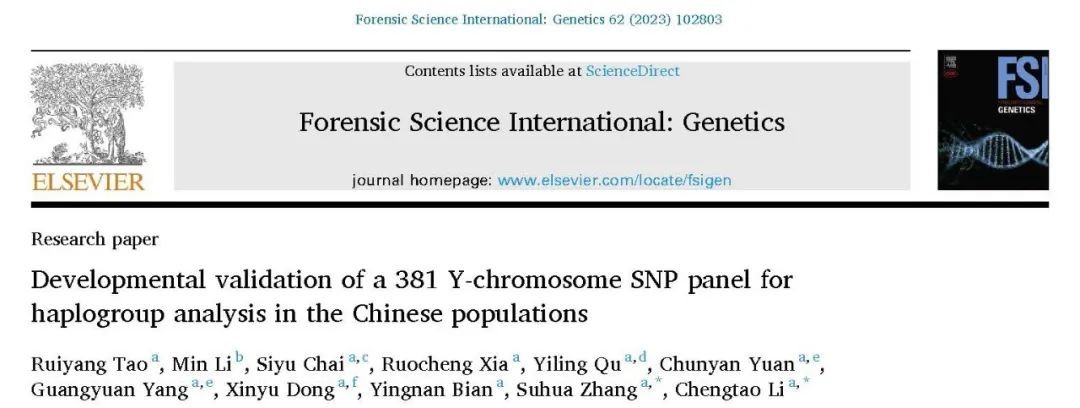
Title: Developmental validation of a 381 Y-chromosome SNP panel for haplogroup analysis in the Chinese populations
Journal: Forensic Science International: Genetics
DNA testing of the Y chromosome is a method of paternal kinship identification, providing evidence and clues for case litigation and criminal investigations. Common methods include testing Y-STR and Y-SNP. Y-chromosome single nucleotide polymorphisms (Y-SNPs) refer to the differences in single nucleotide at the same loci across the Y chromosome.
With the advent of capillary electrophoresis, Y-STR once became the main method for paternal identification. However, most Y-STRs have relatively high mutation rates, and in everyday forensic cases, unrelated males often share Y-STR haplotypes (or males from the same paternal lineage have different haplotypes). Therefore, the authors studied a haplotype detection method for Y-SNPs. Based on the genetic structure characteristics of the Y chromosome in various Chinese regions and populations and the authors' prior research, 381 Y-SNPs were screened, and the SifaMPS 381 Y-SNP panel was designed. This panel can pair specific males with high-resolution Y-SNP haplotypes and is widely used in forensic genetics and evolutionary research.
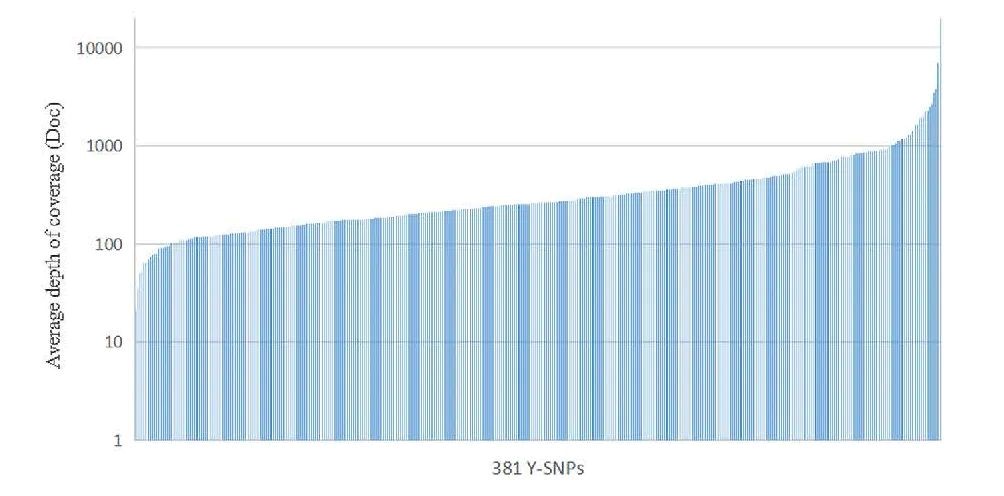
Figure 1. Average depth of coverage (DoC) for SNP sequencing using the SifaMPS 381 Y-SNP panel (n=100)
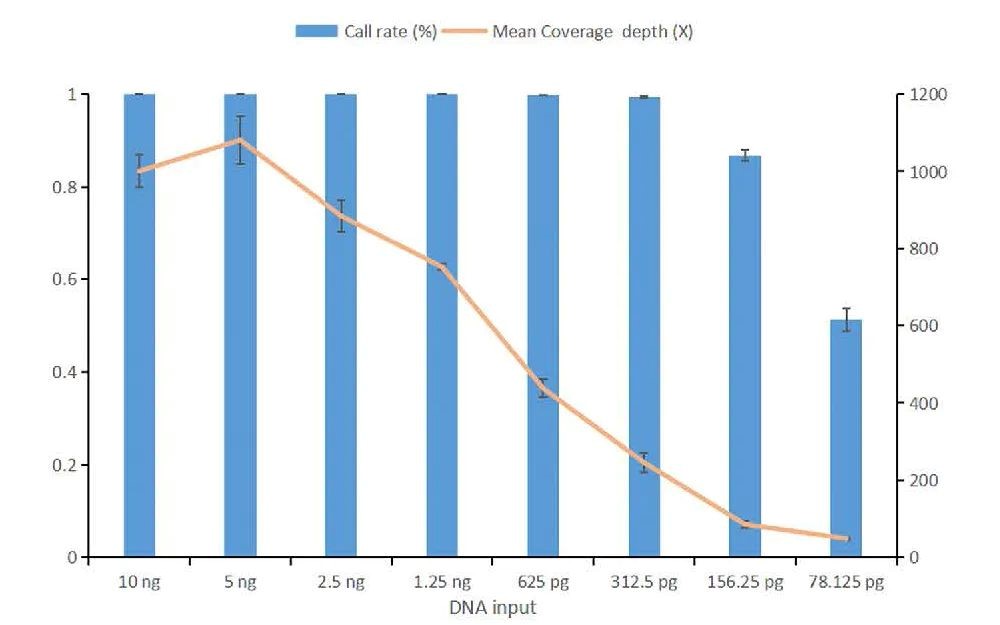
Figure 2. Sensitivity study of the SifaMPS 381 Y-SNP panel using random male DNA from 10 ng to 78.125 pg. The histogram shows the detection rate of 381 SNPs and the relationship between the average depth of coverage (DoC) and different DNA input amounts.
The authors collected whole blood from 100 unrelated Chinese Han males. Using the primer design website (https://design.igenetech.com/), 381 pairs of specific primers were designed for the panel, with each amplicon size within 250 bp. Multiplex amplicon library construction and sequencing were performed, and except for the negative control, all positive controls and 100 unrelated Chinese males were successfully detected for haplotypes.
Next, the authors validated the functionality of the panel. The data showed that the panel's specificity, sensitivity, repeatability, and ability to detect actual samples are excellent. These data indicate that the panel can be used in routine forensic practice.
In forensic on-site sample testing, in addition to using Y-SNP as a marker to trace male individuals in the samples, microhaplotypes can also be used as markers to analyze the components in the samples.
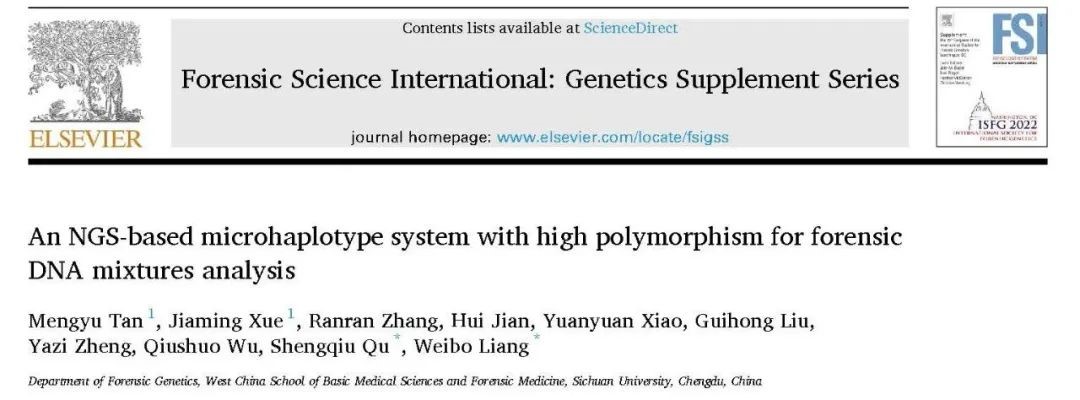
Title: An NGS-based microhaplotype system with high polymorphism for forensic DNA mixtures analysis
Journal: Forensic Science International: Genetics Supplement Series
Analyzing the components of mixtures, such as identifying body fluids and analyzing the number and proportion of contributors, has always been a hot and difficult topic in forensic practice. Microhaplotypes (MHs) contain many effective alleles and can be used to detect the components and proportions of mixtures.
Microhaplotypes refer to allelic combinations of two or more linked SNPs within a fragment length of 200 bp or less. Microhaplotype loci contain multiple SNP sites, belonging to multi-allelic genetic markers. Compared to a single SNP site, microhaplotypes contain richer genetic information, thus having great potential in forensic genetics.
The authors included Indels in the MH, defining it as a generalized MH. The generalized MH retains the advantages of MHs while expanding the number of candidate sites, beneficial for mixture analysis.
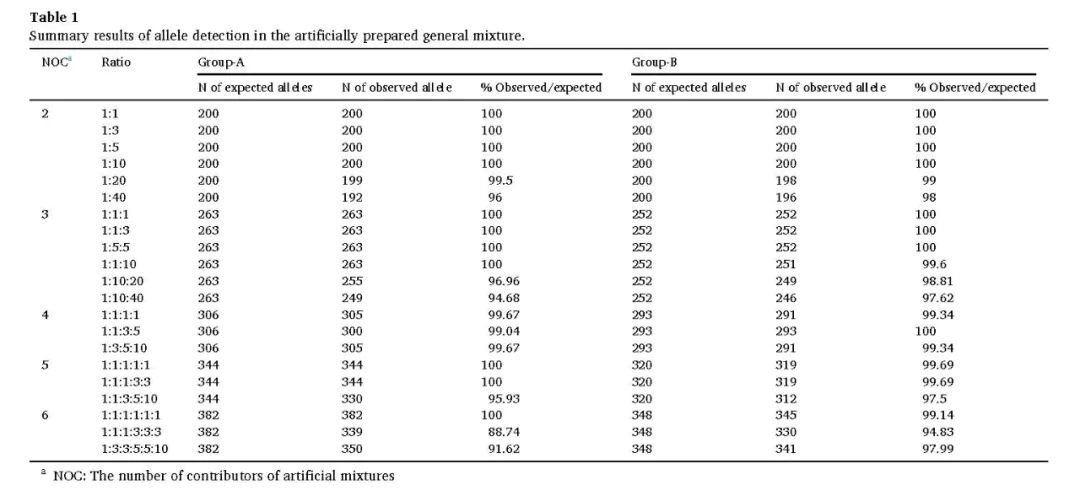
Table 1. Summary of allele detection results in artificially prepared general mixtures
In this study, the authors used multiplex PCR to establish a microhaplotype library based on the Southern Chinese Han population in the Thousand Genomes Project. They developed two panels containing 62 and 71 MHs, respectively, to preliminarily explore the detection performance of the panel in analyzing multi-person and unbalanced mixtures. All results (Table 1) indicate that the panel has high polymorphism and great potential, contributing to more effective detection and analysis of DNA mixtures.
As of November 2022, iGeneTech has partnered with multiple domestic forensic research units, institutions, and companies, developing nearly 30 multiplex amplicon sequencing kits for forensic DNA molecular marker detection, all of which have achieved satisfactory results. In the future, iGeneTech will continue to enhance the upgrading of targeted capture sequencing technology for DNA molecular markers in the forensic field, working closely with experts, professors, and researchers to promote the application of targeted capture sequencing technology in forensic identification and kinship identification.
About iGeneTech®
iGeneTech is a national high-tech enterprise focused on gene capture technology. It owns two independently developed gene capture technology platforms: probe hybridization and multiplex PCR. It also has the capability to provide gene capture technology diagnostic services with ultra-large sample volumes, committed to providing world-leading comprehensive gene capture technology solutions.
After several years of industrial development in gene capture technology, iGeneTech's product line has fully covered the upstream, midstream, and downstream of the gene capture field, including personalized gene capture product custom development, gene capture laboratory LIMS systems, fully automated laboratory solutions, data management and interpretation solutions, laboratory quality management systems, NGS sequencing extreme cycle service solutions, ultra-high throughput sample diagnosis service solutions, etc. iGeneTech has taken the lead in becoming a global provider of comprehensive gene sequencing technology solutions, offering ALL-IN-ONE gene detection solutions covering the entire cycle, highly automated, and intelligently productized for third-party clinical laboratories, hospital precision medicine centers, gene testing companies, researchers, and clinical doctors.